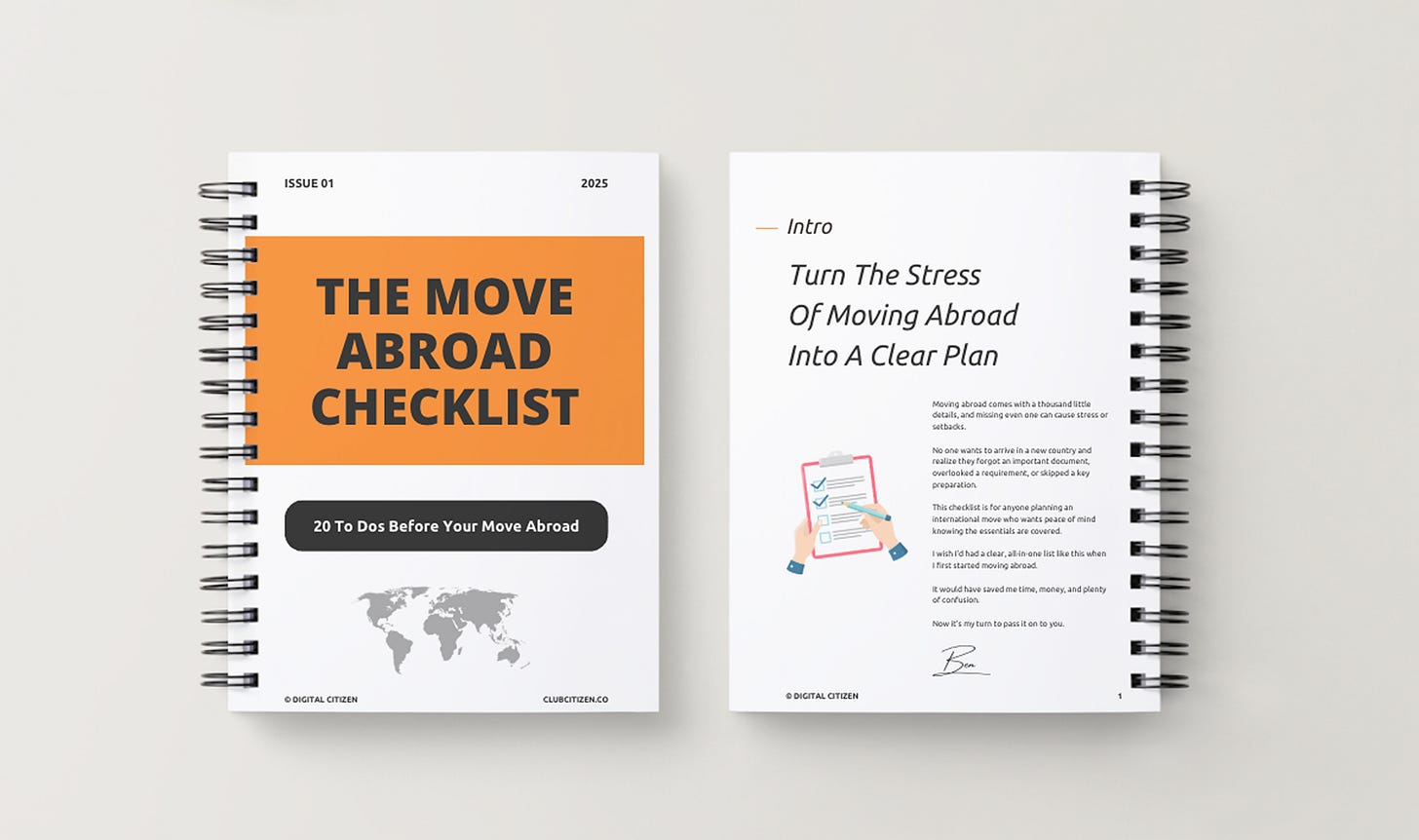5 Things To Know Before Moving To Europe (Not What You Think)
Spoiler: Not About Money Or Language.
People ask me how much money they need to move to Europe. Or what level of local language they need to speak.
But honestly, that’s not the hard part.
Language skills and money help, sure. But the hard part is landing in Europe and realizing you can’t get a bank account. Or that your insurance is useless. Or that your remote job doesn’t give you legal permission to actually be there
Most people plan their move from travel blogs and Reddit threads. Then they arrive and find out nobody mentioned the things that actually matter.
Here’s what we’ll talk about today:
Why “Europe” as a destination doesn’t actually exist
Why navigating bureaucracy will take longer than you expect
Why you can’t access healthcare without residency
How banks reject you without the right legal form
Why your job flexibility doesn’t mean immigration flexibility
Let me walk through the things nobody talks about.
#1: “Europe” Is Not One Place
There are 44 countries in Europe.
Portugal lets you apply for a digital nomad visa with proof of remote work and income. Germany needs health insurance sorted before they’ll even process your application. Spain makes you show up in person for biometrics. France requires different paperwork than Italy, even though they’re both in the EU.
Every country has different requirements. Different timelines. Different bureaucracies.
You cannot plan a move to Europe the same way you cannot plan a move to Asia.
The rules in Portugal have nothing to do with the rules in Poland.
Takeaway: Treating Europe as one destination will waste your time researching the wrong things. Choose the country first. Then learn the rules for that country. Not the other way around.
#2: Bureaucracy Is The Real Challenge
You are going to spend more time in government offices than you think.
Documents that need official translations. Appointments that take weeks to book. Systems that assume you already know how they work. Offices that close at 2pm on Thursdays.
And the real problem?
Figuring out which office handles what.
Discovering you need document A before you can get document B, but you need document B to apply for document A. Showing up at 9am and being told you needed to book online three weeks ago.
Why does it (not) work this way?
In my experience, most offices care more about following processes than helping people. They hide behind procedures instead of solving your problem. Germany is notorious for this. Every expat I know has a horror story about officials who refuse to bend even when the system makes no sense.
Singapore, by contrast, is very efficient. Clear processes, helpful staff, things actually work.
In any case, you cannot control bureaucracy. But you can control your preparation. Show up over-prepared, have document translations ready and know the process before you walk in the door.
I wrote a full guide on which documents you actually need before moving abroad.
Takeaway: Budget time for bureaucracy. More time than you think.
#3: Public Healthcare Is Not Automatic
You land in Europe and assume healthcare just works.
It doesn’t.
Travel insurance covers you for emergencies and doctor visits while you’re a tourist. But accessing the public healthcare system that residents use?
That often requires a residence permit or long-term visa.
Then you need to register with the national health system. In some countries, you need to prove you’ve been paying into social security. In others, you need an appointment just to figure out which office handles registration.
The good news?
International health insurance (not travel insurance!) can cover you across multiple countries. Some people use it to bridge the gap until they register locally. Others (like me) use it full-time instead of relying on public systems.
Three providers worth researching (I have no affiliation with any of them)
Popular with digital nomads. Their essential plan starts around $56 per month for basic emergency coverage, while their complete plan (which includes routine care, mental health, and maternity) starts around $150 per month.
What I use. Offers three tiers (Essential, Special, Exclusive) with unlimited lifetime coverage and no annual caps. Pricing depends on age, destination, and deductible choice. They cover pre-existing conditions after risk assessment and offer strong preventive care options.
Core plans cover hospitalization and emergency care, with optional add-ons for outpatient, dental, and maternity. Maximum entry age is 69. Requires 12-month contract initially.
How much will I have to pay for those?
International health insurance pricing varies widely based on your age, geographic coverage (worldwide vs. regional), service tier, and medical history.
Younger people in their 20s-30s might pay $50-150 per month for basic plans, while comprehensive coverage for someone in their 50s can reach $300-500+ monthly.
Key factors that affect your premium
Your deductible choice (higher deductible = lower premium)
Whether you include or exclude the US (US coverage dramatically increases cost)
Any pre-existing conditions (some insurers exclude them entirely, others cover after risk assessment).
Watch out for annual caps, coverage exclusions, and waiting periods for certain treatments.
Read the fine print on what’s covered for routine care versus emergencies, and check if the plan works in your home country during visits.
Takeaway: Public healthcare requires legal residency and registration first. International health insurance bridges the gap or replaces it entirely, but read their policies carefully. Pricing and coverage vary significantly based on age, location, and medical history.
#4: Local Banking Without Residency Is Almost Impossible
Try opening a bank account without a residence permit.
You (almost always) can’t.
Most European banks require proof of legal residency before they will let you open an account. Some ask for a local address, others want a tax ID number. A few (like e.g. Georgia) will let tourists open accounts, but with restrictions that make them useless for actually living there.
You need a bank account for everything.
Paying rent. Setting up utilities. Getting paid if you’re working remotely. Receiving your residence permit card in some countries.
The good news?
Fintechs can help to some degree. Digital banks like Wise, Revolut, and others let you open accounts without local residency and operate across borders.
They are not perfect replacements for traditional banks, but they solve immediate problems while you sort out the paperwork.
I wrote an article on fintechs here:
Takeaway: You need residency to open a bank account, which means you might be stuck without banking when you first arrive (depending on your visa type and the possibility to still use your home bank). The good news is, fintechs can help while you figure it out.
#5: Your Employers Flexibility Means Nothing to Immigration
Your boss says you can work from anywhere.
Great.
Immigration does not care.
Just because your company lets you work remotely doesn’t mean you have the legal right to live in another country. Tourist visas don’t cover remote work, even if you’re working for a company back home. Most countries require a specific visa or residence permit if you’re staying longer than 90 days, regardless of where your paycheck comes from.
And some countries explicitly ban remote work on tourist visas. You can visit as a tourist. You cannot work, even remotely, even for a non-local company.
Takeaway: Your employment flexibility and your immigration status are separate things, and immigration law wins every time.
The good news?
Many European countries now offer digital nomad or remote work visas designed exactly for this situation. Portugal, Spain, and others have programs that let you live there legally while working for a foreign employer.
You just need to apply for the right visa before you move.
Conclusion
What you learned today:
“Europe” isn’t one place.
Bureaucracy takes longer than you think.
Public healthcare requires legal residency.
Banking requires residency (fintechs can help).
Your remote job does not override local immigration law.
What matters most right now: Choosing your specific target country when doing research.
Not “Europe.” Pick one specific place.
Then research three things (or read about them in the posts linked above):
Banking solutions
Visa requirements
Healthcare options
It will save you time and money.
Thanks for reading and being part of this journey,
— Ben
PS
Grab your Move Abroad Checklist (if you haven’t yet).










Thanks for this...it was helpful. I had just looked recently at long-term travel insurance for 2026 and was wondering how that differed from a straight up health insurance policy. I am starting my own "question" list now. Paperwork is a nightmare and the rules do indeed seem to be the biggest obstacles...and I thought love would solve the problems...lol.